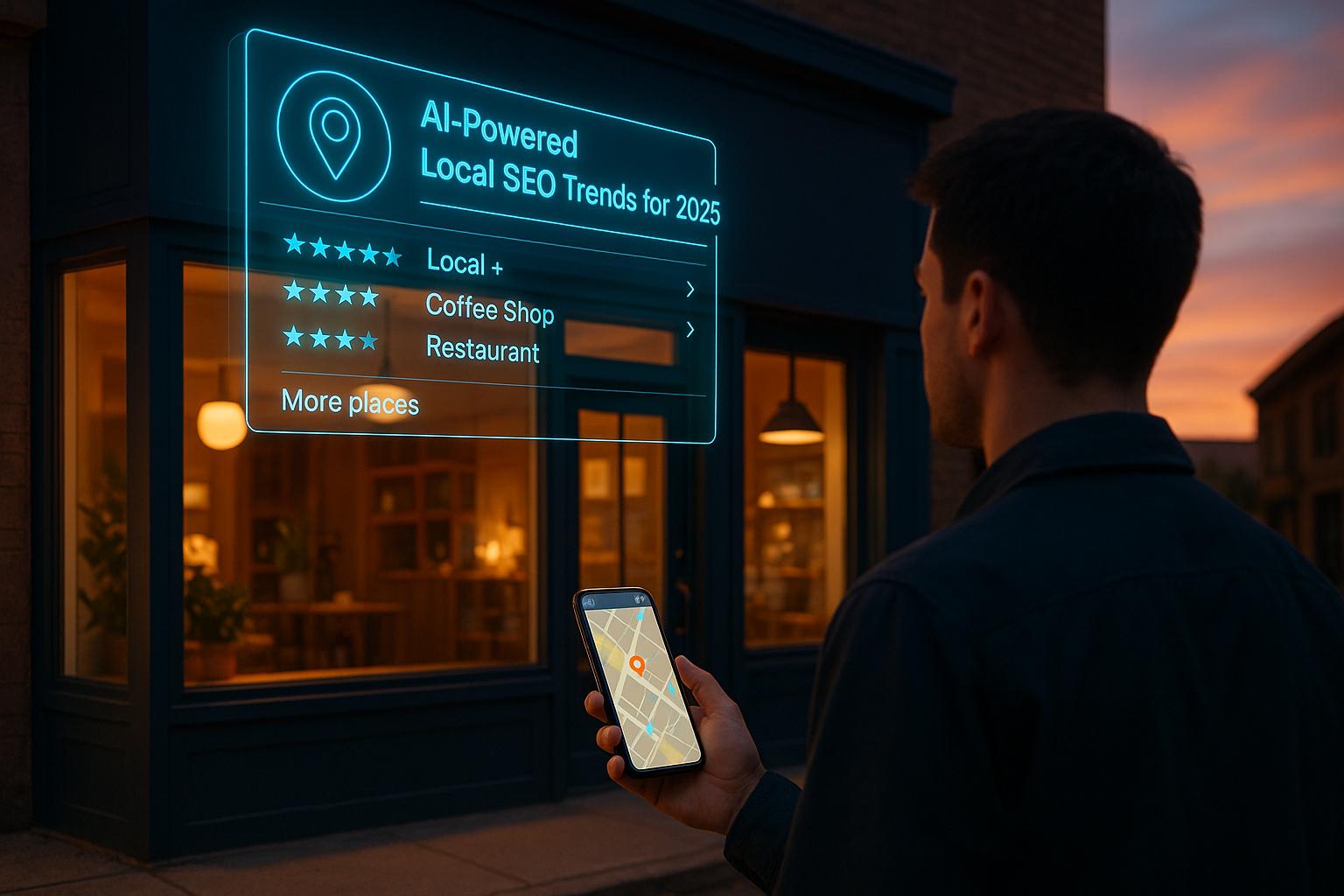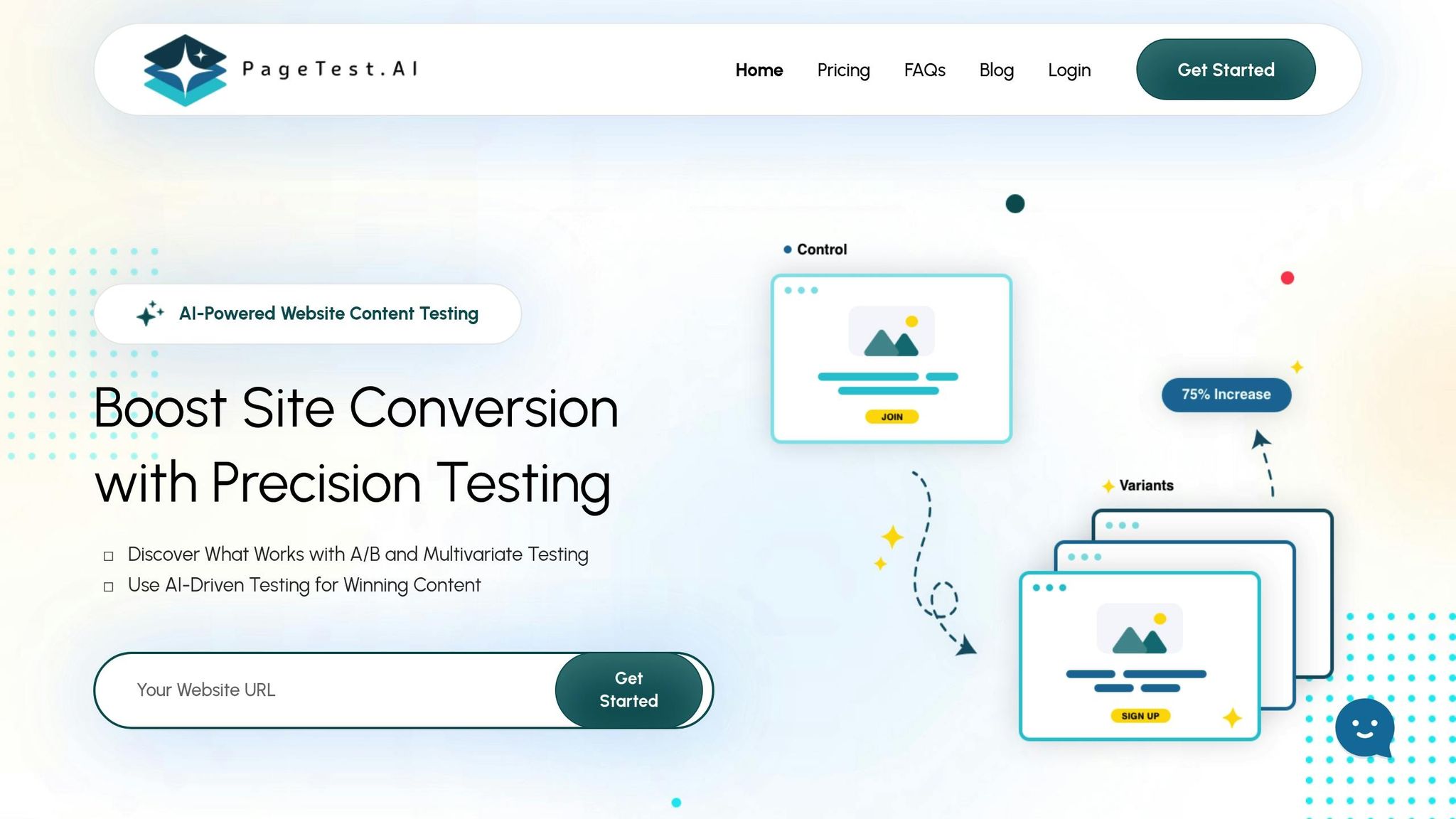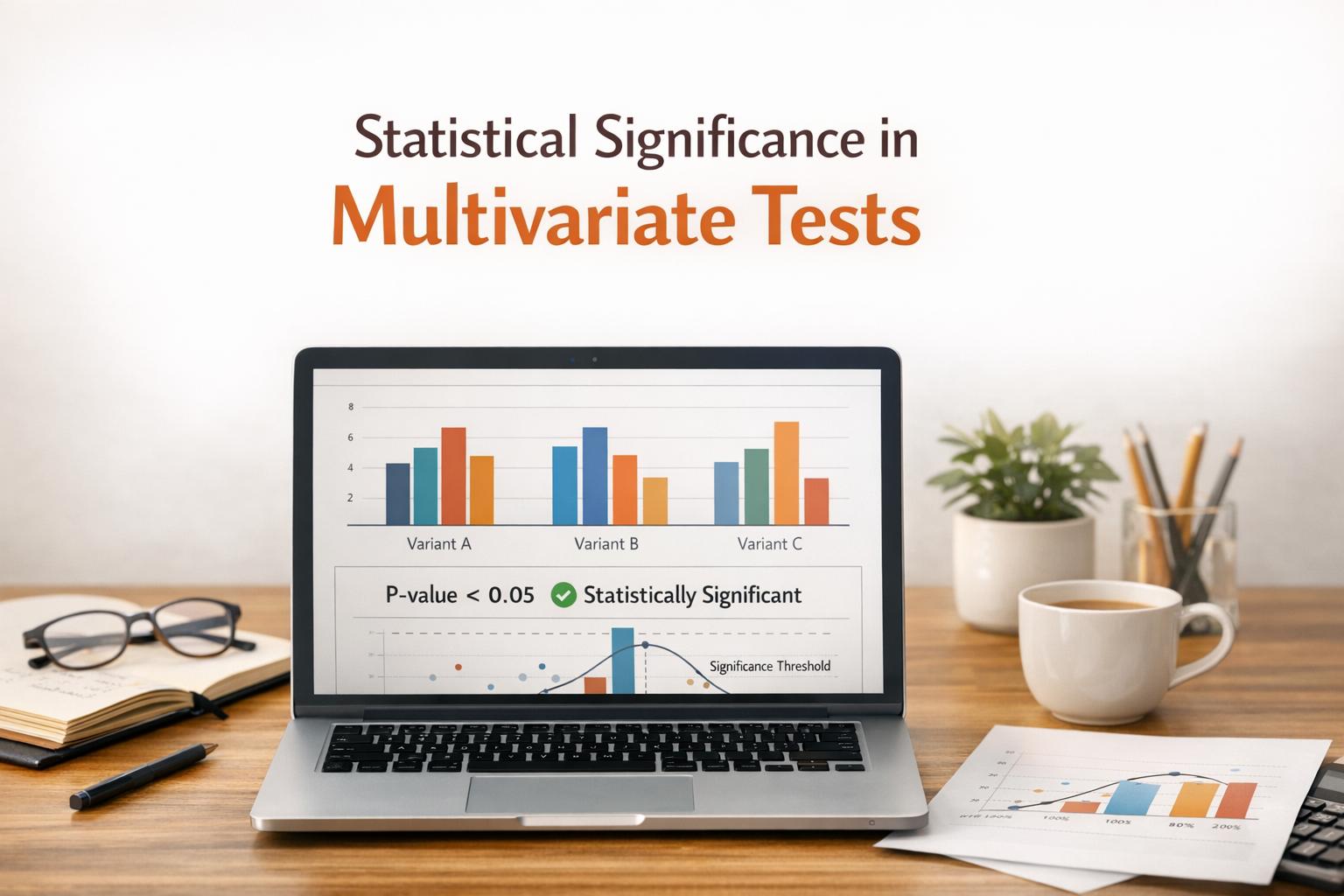

AI-Powered Local SEO Trends for 2025

AI-Powered Local SEO Trends for 2025
 21-10-2025 (Last modified: 23-10-2025)
21-10-2025 (Last modified: 23-10-2025)
AI is transforming local SEO in 2025. Businesses are moving beyond static listings to dynamic, real-time strategies driven by automation, personalization, and data analysis. Here’s what you need to know:
- Automation: AI tools handle tasks like updating business profiles and managing citations, saving time and reducing errors.
- Personalization: Search results are tailored to user intent, location, and behavior, creating more relevant experiences.
- Real-Time Data: AI analyzes trends and user activity instantly, allowing businesses to adjust strategies quickly.
Key stats:
- Over 60% of local searches are influenced by AI personalization.
- Businesses using AI tools report up to a 30% increase in foot traffic.
- Long-tail, conversational queries have grown by 40% year-over-year.
AI tools like Yext, Moz Local, and PageTest.AI help businesses optimize Google Business Profiles, manage reviews, and test landing pages for higher conversions. The shift from static SEO (Local SEO 1.0) to AI-driven methods (Local SEO 3.0) is reshaping how businesses connect with local customers.
Takeaway: To stay competitive, focus on real-time updates, intent-based optimization, and tools that improve visibility and engagement.
10 Local SEO Strategies That Actually Work in the AI Era
How Local SEO Has Changed: From Basic Data to AI-Powered Methods
Local SEO has seen a dramatic transformation in digital marketing. What started as a straightforward task of managing directory listings has now evolved into a sophisticated, AI-driven approach.
Local SEO 1.0 vs. Local SEO 3.0
- Local SEO 1.0 was all about getting the basics right – ensuring a business’s name, address, and phone number (NAP) were consistent across online directories and platforms.
- Local SEO 3.0 takes it several steps further, using AI to harness real-time data, customer insights, and personalization. These advanced methods help match user intent and improve visibility across multiple channels. Today’s platforms can automatically update business details across directories while analyzing user behavior to understand what searchers are looking for. This results in dynamic, context-aware optimization.
| Local SEO 1.0 | Local SEO 3.0 (2025) |
|---|---|
| Focus on citation consistency | AI-powered, real-time optimization |
| Manual directory updates | Automated updates and insights |
| Basic keyword targeting | Intent-driven, conversational search |
| Static business details | Dynamic, personalized content |
| Limited engagement | Increased interaction through reviews and user-generated content |
The numbers speak for themselves. Over 60% of marketers now rely on AI tools for tasks like keyword research, content creation, and review management. Additionally, businesses with fully optimized Google Business Profiles are 2.7 times more likely to be seen as trustworthy by consumers.
These changes highlight a shift from simple data management to smarter, AI-powered solutions that deliver more intuitive search results. This evolution underscores AI’s growing role in understanding user intent.
How AI Improves Intent-Based Search
As SEO evolves from static to dynamic strategies, AI has made interpreting user intent more precise than ever. The traditional approach of matching exact keywords has given way to understanding context, user behavior, and subtle nuances in queries. For instance, when someone searches for “romantic dinner spot with outdoor seating”, AI doesn’t just look for matching keywords – it identifies the intent behind the search and suggests upscale venues with the right ambiance.
AI also factors in contextual signals like urgency, time of day, and location. A search for “locksmith” at 2:00 AM prioritizes emergency services, while a daytime search might highlight providers offering consultations or installations.
The rise of long-tail, conversational queries has further changed the game. Businesses are now optimizing for natural language and specific customer questions. Instead of targeting broad terms like “dentist Chicago”, successful businesses focus on more detailed queries, such as which dentists accept specific insurance plans or offer weekend appointments.
Thanks to AI and machine learning, local search results are becoming increasingly relevant and personalized. Algorithms continuously adapt based on user interactions, delivering better results over time. For businesses, staying competitive means understanding their local audience’s unique needs and keeping their profiles accurate and up to date so AI systems can easily interpret them.
AI Methods for Google Business Profile Optimization
Google Business Profiles play a crucial role in local search, and AI is transforming how businesses manage and enhance these listings. With modern AI tools, profiles can be updated and optimized automatically, ensuring they perform well in local search results. This approach builds on earlier AI capabilities, delivering quicker and more precise local optimizations.
Automated Profile Updates and Content Suggestions
AI tools simplify the process of keeping business profiles up-to-date and engaging. By integrating with business management software, they can detect changes to hours, services, or promotions and update profiles accordingly. For example, a national restaurant chain that deployed an AI tool across 120 locations saw a 28% increase in local impressions and a 19% boost in direct calls thanks to improved profile updates. As mentioned earlier, real-time updates are essential for effective local SEO.
AI can also identify trends and suggest content ideas. For instance, if “outdoor dining” becomes a popular search term in a particular ZIP code during spring, the system might recommend promoting patio seating or seasonal menu items. Additionally, these tools ensure profiles are complete by flagging missing elements like photos, descriptions, or services, helping businesses stay optimized for local search.
AI-Powered Review Management
Customer reviews are a major factor in local search rankings, influencing up to 17% of local pack ranking factors. AI tools monitor reviews in real time, analyze their sentiment, and generate responses or alerts as needed. For example, a dental group with multiple locations used AI to respond to 95% of new reviews within 24 hours, leading to better overall ratings. Through sentiment analysis, these tools can also identify negative trends early, allowing businesses to address potential issues quickly. This proactive review management complements the broader strategy of maintaining real-time profile accuracy.
Maintaining Consistent Citation Data Across Platforms
Consistency in citation data is another key factor for local rankings, and AI tools have significantly reduced citation errors – by up to 40% for multi-location businesses. These systems continuously scan listings across platforms like Yelp, Bing Places, and Apple Maps, comparing them to the primary Google Business Profile. When discrepancies arise, such as mismatched phone numbers or outdated addresses, AI can either correct the information automatically or notify managers for manual updates. Additionally, when businesses open new locations or introduce new services, AI can update dozens of directories simultaneously, ensuring accurate information is available from the start. This consistency builds trust and reinforces the reliability of AI-driven optimization efforts.
Main AI-Driven Factors That Affect Local SEO Rankings
AI has reshaped how local businesses are ranked, moving away from static keyword matching to dynamic, real-time signals. By understanding these AI-driven factors, businesses can adapt and stay competitive in the fast-changing local SEO space of 2025. Factors like real-time keyword trends, structured data use, and personalized user engagement are now key to achieving better rankings in local search results.
Real-Time Keyword Optimization
AI tools now continuously analyze search trends and user behavior, enabling businesses to adjust their keywords instantly. This real-time approach ensures businesses can capitalize on trending local searches as they happen, rather than missing out on opportunities.
Platforms such as Search Atlas and OTTO SEO provide dashboards that suggest long-tail, intent-driven keywords tailored to emerging local trends. For example, instead of targeting broad terms like “pizza restaurant”, businesses can focus on specific, conversational phrases like “best thin crust pizza delivery near downtown”, which are increasingly popular due to voice search and AI-driven interfaces.
By embracing this strategy, businesses can align their content with what local customers are actively searching for, making their offerings more visible and relevant.
Structured Data and Entity-Based Content
In addition to keyword optimization, technical improvements like structured data play a critical role in boosting visibility. Search engines now rely heavily on structured data to understand what a business offers, where it’s located, and how it connects to user queries. Schema markup and entity-based content allow AI to categorize businesses more accurately and display them in relevant local search results.
For example, using schema markup to highlight business hours, services, and location can help trigger rich search results and improve voice search visibility. Meanwhile, entity-based content establishes clear connections between a business and its services, location, and unique qualities. A dental practice, for instance, might go beyond generic terms like “dental services” by creating content that details specific procedures, addresses local patient needs, and showcases expertise in specialized treatments.
This approach improves the chances of appearing in local packs and voice search results because it helps AI algorithms understand the business’s relevance for particular queries. Regularly updating schema markup and crafting detailed, location-specific content are essential steps for businesses looking to maximize their presence in AI-driven search results.
Personalization and User Behavior Data
AI doesn’t just rely on technical signals – it also uses user behavior to refine local search results. Personalization now plays a huge role, with AI tailoring search outcomes based on factors like user behavior, location, device type, and engagement patterns. This means two people searching for the same service in the same city might see entirely different results, influenced by their search history, preferences, and past interactions with local businesses.
Metrics such as dwell time, click-through rates, direction requests, call volume, and review activity are all tracked in real-time and directly impact local rankings. Businesses that generate higher engagement and satisfaction are rewarded with better visibility.
Personalization also considers details like time of day, device type, and seasonal preferences. For instance, a coffee shop might rank higher for morning searches on mobile devices, while a restaurant might gain prominence for evening searches on desktops when people are planning dinner.
To take advantage of this, businesses should focus on encouraging customer engagement through reviews, check-ins, and website interactions. Monitoring analytics and adapting strategies based on user behavior is crucial. This could mean optimizing for mobile users, creating content tied to local events or seasonal trends, and ensuring that increased visibility translates into meaningful interactions.
sbb-itb-6e49fcd
AI Tools for Local SEO and Conversion Optimization
AI is transforming local SEO by leveraging real-time data and automation. Specialized tools now go beyond managing business listings – they also streamline conversion paths for local businesses, creating a more efficient way to attract and retain customers.
Platforms for Local SEO Management
AI-powered platforms like Yext and Moz Local have become go-to solutions for automating citation management and optimizing business listings across numerous directories.
- Yext: Starting at around $199/year per location, Yext scans, updates, and synchronizes business information across major directories, reducing manual errors by up to 90%.
- Moz Local: Priced at about $14/month per location, Moz Local specializes in data synchronization and provides detailed analytics to show which directories generate the most traffic and engagement.
These tools are essential for businesses, considering that 8 out of 10 U.S. consumers search for local businesses online weekly, and 32% do so daily. Their primary advantage lies in maintaining consistency across all digital platforms. When a business updates its hours, phone number, or services, these changes are automatically reflected across all connected directories. This ensures that customers always encounter accurate, up-to-date information.
However, while these platforms excel at driving traffic, converting that traffic into customers requires an additional layer of optimization – dynamic landing page testing.
PageTest.AI for Conversion Optimization

Turning website visitors into paying customers demands more than just accurate listings. Tools like PageTest.AI help local businesses fine-tune their landing pages and website content without needing technical expertise, making it a perfect complement to local SEO efforts.
With its no-code interface, PageTest.AI enables business owners to test variations of key elements like headlines and calls-to-action using a simple Chrome extension. What sets it apart is its ability to generate AI-driven content variations. By analyzing successful patterns, the platform creates optimized alternatives tailored to specific locations or customer behaviors. For example, businesses can test location-specific headlines, service descriptions, or calls-to-action that encourage actions like phone calls or in-store visits.
The platform tracks performance metrics such as clicks, engagement time, scroll depth, and user behavior. These insights help businesses understand how different customer segments interact with their content. For instance, a restaurant might discover that mobile users respond better to “Order Now” buttons, while desktop users prefer “View Menu” options.
PageTest.AI integrates seamlessly with popular website builders like WordPress, Wix, Shopify, and Magento, eliminating the need for additional coding or technical setup.
“Love this product, it means we get the most from our site’s traffic. Knowing we can test every call to action and optimize our SEO efforts is very satisfying.” – David Hall, CEO, AppInstitute
The platform offers flexible pricing plans:
- Free Trial: Includes 10,000 test impressions, 5 pages, and 5 tests.
- Startup Plan: At $10/month, it expands to 10 pages and 10 tests.
- Enterprise Plan: At $50/month, it supports up to 100,000 test impressions and 100 pages, ideal for multi-location businesses or those with extensive service offerings.
Combining Local SEO and Conversion Optimization
A real-world example demonstrates the power of combining local SEO management with conversion optimization. A multi-location restaurant chain used Moz Local for citation management alongside PageTest.AI for landing page testing. Within three months, they saw a 15% increase in online reservations. Accurate listings drove traffic, while optimized landing pages converted that traffic into actionable results.
Given that most “near me” searches come from mobile devices, optimizing for mobile is critical. PageTest.AI’s ability to test mobile-specific variations – like shorter headlines, larger buttons, and simplified forms – addresses this need directly. These optimized interactions not only boost conversions but also generate positive user signals, which AI algorithms use to improve search rankings.
With over 60% of marketers now using AI tools for local SEO, businesses that combine precise listing management with systematic conversion testing are well-equipped to capture and convert local search traffic effectively.
Future Trends in AI-Powered Local SEO
AI is reshaping the landscape of local SEO, giving businesses new tools to stay ahead in an increasingly competitive market.
AI Adoption Among Local Businesses
Local businesses are diving headfirst into AI-powered tools, leaving behind traditional SEO methods for more data-driven strategies. Platforms like SEMrush and Ahrefs now provide real-time insights into keyword performance, helping businesses fine-tune their SEO efforts on the fly. Machine learning algorithms are also stepping in, tracking ranking signals in real time and automatically optimizing keywords, on-page content, and other ranking factors based on the latest search trends. A newer metric called AI visibility is emerging, which measures how businesses appear in AI-driven search results alongside traditional SEO rankings. These advancements are helping businesses adapt to shifting consumer behaviors.
Changes in Consumer Search Behavior
Consumer search habits are evolving, with more people using conversational and nuanced queries. Instead of generic terms, users now search for specifics, such as “Best vegan restaurants in Chicago for a weekend brunch.” This shift means businesses must focus on showcasing trust, availability, and local relevance in their listings.
The rise of voice search has further transformed the game. Consumers now expect personalized results across platforms like Google Maps and social media. Search engines are no longer just matching keywords; they’re analyzing the context of a user’s location and intent. With AI processing this contextual data and updating rankings based on real-time interactions, businesses must go beyond targeting broad terms to meet these new demands.
Year-Over-Year SEO Metrics Comparisons
The impact of AI-driven strategies can be seen in measurable outcomes. For example, “near me” searches often lead to visits within 24 hours, showing how effective AI can be in driving foot traffic. While exact figures for increases in engagement and conversions vary, the trend is clear: AI’s ability to analyze complex data and understand nuanced search intent is helping businesses deliver more personalized experiences at scale.
Conclusion: Using AI for Local SEO Success in 2025
The evolution from simple keyword targeting to AI-powered, intent-focused strategies marks a major turning point in the world of local SEO. Businesses that adapt to this shift are setting themselves up to connect with the growing number of consumers who rely on local search results to make quick decisions.
Success in 2025 hinges on three main strategies: using AI for real-time optimization, ensuring data consistency across platforms, and turning increased visibility into actual customer engagement. By combining automated insights with human expertise, businesses can create authentic, localized content that resonates with their audience.
Real-time adjustments have become a necessity. AI tools can now process thousands of local search queries to pinpoint which keywords are driving foot traffic and conversions – something that would be nearly impossible to manage manually, especially for businesses with multiple locations. This allows companies to refine their strategies based on real-world performance data.
Pairing conversion rate optimization with local SEO creates a seamless system for acquiring customers. Tools like PageTest.AI help businesses test and fine-tune critical website elements such as headlines, calls-to-action, and product descriptions. These optimizations turn visibility into meaningful customer actions, tracking metrics like time spent on a page and scroll depth, which influence both conversions and on-page SEO performance.
The businesses that succeed are those that treat local SEO as an interconnected system rather than a collection of isolated tactics. By maintaining accurate data across directories, creating location-specific content at scale, and continuously testing website performance, they maximize the potential of local search traffic. AI plays a crucial role here, offering the tools to streamline these efforts while ensuring consistency and relevance.
Ultimately, the edge goes to businesses that can adapt quickly to algorithm changes without losing sight of their connection to the local community. While AI provides the efficiency and insights to scale these efforts, success still depends on truly understanding local customers and delivering meaningful value at every digital interaction.
FAQs
How can AI tools help businesses improve local SEO personalization in 2025?
AI tools have the power to transform local SEO by helping businesses deliver tailored customer experiences. These tools dig into user behavior, preferences, and local search patterns to fine-tune critical website elements like headlines, calls-to-action (CTAs), and product descriptions.
With AI-driven insights, businesses can make smarter decisions based on data, improving engagement and driving higher conversion rates. Plus, these tools streamline testing, making it easier and faster for companies to adjust their content to better connect with their audience.
How has AI transformed local SEO, and what sets the latest trends apart from earlier strategies?
AI has transformed local SEO, bringing advanced tools and strategies that help businesses connect more effectively with nearby audiences. Today’s AI-powered approaches go beyond traditional methods by emphasizing personalization, predictive analytics, and real-time data to improve visibility and interaction.
Take Google My Business as an example. AI now helps optimize profiles by analyzing user behavior, offering tailored update suggestions, and even automating responses to reviews. These advancements allow businesses to keep up in an ever-changing digital world while staying relevant to their local customers.
How can AI-powered tools help businesses keep their information consistent across local directories?
AI-driven tools make it much easier to manage business information across numerous local directories by automating updates and keeping details accurate. These platforms rely on machine learning to spot inconsistencies, fix errors, and sync essential data – like business names, addresses, phone numbers, and operating hours – across multiple listings.
Keeping citation data consistent not only boosts local SEO rankings but also strengthens customer trust and ensures a smooth user experience. Using AI for this task saves time and minimizes the chances of outdated or conflicting information showing up online.
Related Blog Posts
say hello to easy Content Testing
try PageTest.AI tool for free
Start making the most of your websites traffic and optimize your content and CTAs.
Related Posts

 24-01-2026
24-01-2026
 Ian Naylor
Ian Naylor
Statistical Significance in Multivariate Tests
How to get reliable results from multivariate tests using fractional designs, statistical corrections, variance reduction, and AI automation.

 22-01-2026
22-01-2026
 Ian Naylor
Ian Naylor
AI in Real-Time Performance Monitoring
AI-powered real-time monitoring uses predictive analytics, adaptive anomaly detection, and automation to cut downtime, boost efficiency, and improve conversions.

 20-01-2026
20-01-2026
 Ian Naylor
Ian Naylor
How Search Intent Impacts Conversions
Aligning content to search intent is the most effective way to turn traffic into customers and reduce bounce rates.
